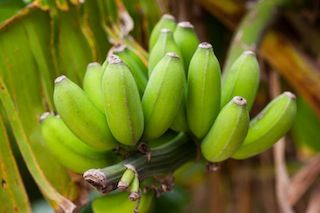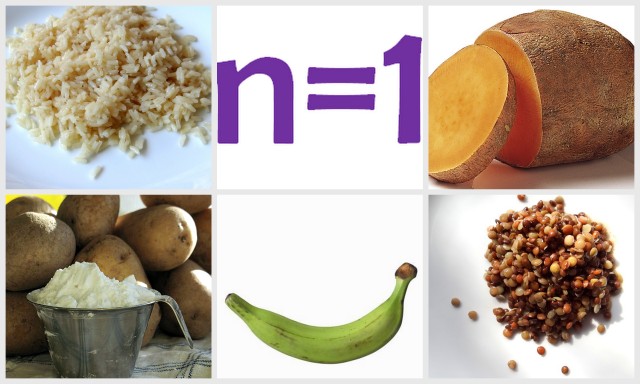 |
| From |
Post moved to www.potatohack.com
Discussions on potato diets, resistant starch, gut health, prebiotics, probiotics, oil-pulling, cold thermogenesis, and other affairs of plain living...
 |
| From |
 |
| Picture Credit |
Resistant starch (RS) is starch that does not get digested in the stomach or small intestine and enters the large intestine intact.
 |
| That's 20g of RS, ya'all! |
| Kingdom | Phylum | Class | Order | Family | Genus | Relative Abundance (%) |
| Bacteria | Bacteroidetes | Bacteroidia | Bacteroidales | Bacteroidaceae | Bacteroides | |
| Bacteria | Firmicutes | Clostridia | Clostridiales | Ruminococcaceae | --- | |
| Bacteria | Actinobacteria | Actinobacteria | Bifidobacteriales | Bifidobacteriaceae | Bifidobacterium | |
| Bacteria | Firmicutes | Clostridia | Clostridiales | Lachnospiraceae | --- | |
| Bacteria | Firmicutes | Clostridia | Clostridiales | Ruminococcaceae | Faecalibacterium | |
| Bacteria | Firmicutes | Clostridia | Clostridiales | --- | --- | |
| Bacteria | Bacteroidetes | Bacteroidia | Bacteroidales | Rikenellaceae | --- | |
| Bacteria | Firmicutes | Clostridia | Clostridiales | Clostridiaceae | --- | |
| Bacteria | Bacteroidetes | Bacteroidia | Bacteroidales | [Paraprevotellaceae] | Paraprevotella | |
| Bacteria | Proteobacteria | Betaproteobacteria | Burkholderiales | Alcaligenaceae | Sutterella | |
| Bacteria | Bacteroidetes | Bacteroidia | Bacteroidales | Porphyromonadaceae | Parabacteroides | |
| Bacteria | Tenericutes | Mollicutes | RF39 | --- | --- | |
| Bacteria | Firmicutes | Clostridia | Clostridiales | Veillonellaceae | Phascolarctobacterium | |
| Bacteria | Firmicutes | Clostridia | Clostridiales | Lachnospiraceae | Lachnobacterium | |
| Bacteria | Firmicutes | Clostridia | Clostridiales | Lachnospiraceae | Coprococcus | |
| Bacteria | Firmicutes | Clostridia | Clostridiales | Lachnospiraceae | Blautia | |
| Bacteria | Bacteroidetes | Bacteroidia | Bacteroidales | [Barnesiellaceae] | --- | |
| Bacteria | Firmicutes | Clostridia | Clostridiales | Ruminococcaceae | Oscillospira | |
| Bacteria | Firmicutes | Clostridia | Clostridiales | Ruminococcaceae | Ruminococcus | |
| Bacteria | Firmicutes | Clostridia | Clostridiales | Lachnospiraceae | Lachnospira | |
| Bacteria | Firmicutes | Clostridia | Clostridiales | Lachnospiraceae | Roseburia | |
| Bacteria | Bacteroidetes | Bacteroidia | Bacteroidales | [Paraprevotellaceae] | --- | |
| Bacteria | Proteobacteria | Deltaproteobacteria | Desulfovibrionales | Desulfovibrionaceae | Desulfovibrio | |
| Bacteria | Firmicutes | Clostridia | Clostridiales | Lachnospiraceae | [Ruminococcus] | |
| Bacteria | Bacteroidetes | Bacteroidia | Bacteroidales | [Odoribacteraceae] | Butyricimonas | |
| Bacteria | Firmicutes | Clostridia | Clostridiales | Lachnospiraceae | Dorea | |
| Bacteria | Bacteroidetes | Bacteroidia | Bacteroidales | Prevotellaceae | Prevotella | |
| Bacteria | Bacteroidetes | Bacteroidia | Bacteroidales | --- | --- | |
| Bacteria | Bacteroidetes | Bacteroidia | Bacteroidales | [Odoribacteraceae] | Odoribacter | |
| Bacteria | Firmicutes | Bacilli | Lactobacillales | Streptococcaceae | Streptococcus | |
| Bacteria | Firmicutes | Erysipelotrichi | Erysipelotrichales | Erysipelotrichaceae | [Eubacterium] | |
| Bacteria | Firmicutes | Clostridia | Clostridiales | Christensenellaceae | --- | |
| Bacteria | Actinobacteria | Coriobacteriia | Coriobacteriales | Coriobacteriaceae | Collinsella | |
| Bacteria | Verrucomicrobia | Verrucomicrobiae | Verrucomicrobiales | Verrucomicrobiaceae | Akkermansia | |
| Bacteria | Firmicutes | Erysipelotrichi | Erysipelotrichales | Erysipelotrichaceae | --- | |
| Bacteria | Firmicutes | Clostridia | Clostridiales | Lachnospiraceae | Anaerostipes | |
| Bacteria | Lentisphaerae | [Lentisphaeria] | Victivallales | Victivallaceae | --- | |
| Bacteria | Firmicutes | Bacilli | Lactobacillales | Lactobacillaceae | Lactobacillus | |
| Bacteria | Firmicutes | Clostridia | Clostridiales | Clostridiaceae | Clostridium | |
| Archaea | Euryarchaeota | Methanobacteria | Methanobacteriales | Methanobacteriaceae | Methanobrevibacter | |
| Bacteria | Firmicutes | Clostridia | Clostridiales | [Mogibacteriaceae] | --- | |
| Bacteria | Firmicutes | Clostridia | Clostridiales | Veillonellaceae | Dialister | |
| Bacteria | Firmicutes | Clostridia | Clostridiales | Peptococcaceae | Peptococcus | |
| Bacteria | Proteobacteria | Deltaproteobacteria | Desulfovibrionales | Desulfovibrionaceae | Bilophila | |
| Bacteria | Proteobacteria | Gammaproteobacteria | Enterobacteriales | Enterobacteriaceae | --- | |
| Bacteria | Firmicutes | Clostridia | Clostridiales | Clostridiaceae | SMB53 | |
| Bacteria | Proteobacteria | Betaproteobacteria | Burkholderiales | Oxalobacteraceae | Oxalobacter | |
| Bacteria | Firmicutes | Clostridia | Clostridiales | [Tissierellaceae] | Finegoldia | |
| Bacteria | Actinobacteria | Coriobacteriia | Coriobacteriales | Coriobacteriaceae | --- | |
| Bacteria | Proteobacteria | Betaproteobacteria | Neisseriales | Neisseriaceae | Neisseria | |
| Bacteria | Actinobacteria | Actinobacteria | Actinomycetales | Corynebacteriaceae | Corynebacterium | |
| Bacteria | Firmicutes | Bacilli | Lactobacillales | Lactobacillaceae | --- | |
| Bacteria | Cyanobacteria | Chloroplast | Streptophyta | --- | --- | |
| Bacteria | Firmicutes | Clostridia | Clostridiales | Dehalobacteriaceae | Dehalobacterium | |
| Bacteria | Actinobacteria | Coriobacteriia | Coriobacteriales | Coriobacteriaceae | Slackia | |
| Bacteria | Actinobacteria | Actinobacteria | Actinomycetales | Micrococcaceae | Rothia | |
| Bacteria | Proteobacteria | Betaproteobacteria | Neisseriales | Neisseriaceae | --- | |
| Bacteria | Firmicutes | Erysipelotrichi | Erysipelotrichales | Erysipelotrichaceae | Holdemania | |
| Bacteria | Firmicutes | Bacilli | Turicibacterales | Turicibacteraceae | Turicibacter | |
| Bacteria | Firmicutes | Bacilli | Lactobacillales | Leuconostocaceae | Leuconostoc | |
| Bacteria | Proteobacteria | Betaproteobacteria | Burkholderiales | Oxalobacteraceae | --- | |
| Bacteria | Firmicutes | Clostridia | SHA-98 | --- | --- | |
| Bacteria | Firmicutes | Bacilli | Lactobacillales | Carnobacteriaceae | Granulicatella | |
| Bacteria | Bacteroidetes | Bacteroidia | Bacteroidales | Porphyromonadaceae | Porphyromonas | |
| Bacteria | Proteobacteria | Betaproteobacteria | Burkholderiales | Comamonadaceae | Limnobacter | |
| Bacteria | Firmicutes | Clostridia | Clostridiales | Ruminococcaceae | Anaerotruncus | |
| Bacteria | Firmicutes | Clostridia | Clostridiales | Peptococcaceae | --- | |
| Bacteria | Firmicutes | Bacilli | Lactobacillales | Streptococcaceae | Lactococcus | |
| Bacteria | Firmicutes | Bacilli | Lactobacillales | --- | --- | |
| Bacteria | Bacteroidetes | Flavobacteriia | Flavobacteriales | [Weeksellaceae] | Chryseobacterium | |
| Bacteria | Actinobacteria | Coriobacteriia | Coriobacteriales | Coriobacteriaceae | Adlercreutzia | |
| Bacteria | Actinobacteria | Actinobacteria | Actinomycetales | Propionibacteriaceae | Propionibacterium | |
| Bacteria | Proteobacteria | Gammaproteobacteria | Pseudomonadales | Pseudomonadaceae | Pseudomonas | |
| Bacteria | Proteobacteria | Gammaproteobacteria | Pasteurellales | Pasteurellaceae | Haemophilus | |
| Bacteria | Proteobacteria | Gammaproteobacteria | Enterobacteriales | Enterobacteriaceae | Morganella | |
| Bacteria | Proteobacteria | Gammaproteobacteria | Enterobacteriales | Enterobacteriaceae | Enterobacter | |
| Bacteria | Proteobacteria | Deltaproteobacteria | Desulfovibrionales | Desulfovibrionaceae | --- | |
| Bacteria | Proteobacteria | Betaproteobacteria | Rhodocyclales | Rhodocyclaceae | Thauera | |
| Bacteria | Proteobacteria | Betaproteobacteria | Burkholderiales | Oxalobacteraceae | Janthinobacterium | |
| Bacteria | Proteobacteria | Betaproteobacteria | Burkholderiales | --- | --- | |
| Bacteria | Proteobacteria | Alphaproteobacteria | Sphingomonadales | Sphingomonadaceae | Sphingobium | |
| Bacteria | Proteobacteria | Alphaproteobacteria | Rhizobiales | Brucellaceae | Ochrobactrum | |
| Bacteria | Proteobacteria | Alphaproteobacteria | Caulobacterales | Caulobacteraceae | Brevundimonas | |
| Bacteria | Firmicutes | Erysipelotrichi | Erysipelotrichales | Erysipelotrichaceae | cc_115 | |
| Bacteria | Firmicutes | Erysipelotrichi | Erysipelotrichales | Erysipelotrichaceae | Coprobacillus | |
| Bacteria | Firmicutes | Clostridia | Clostridiales | [Tissierellaceae] | Peptoniphilus | |
| Bacteria | Firmicutes | Clostridia | Clostridiales | [Tissierellaceae] | Parvimonas | |
| Bacteria | Firmicutes | Clostridia | Clostridiales | [Tissierellaceae] | Anaerococcus | |
| Bacteria | Firmicutes | Clostridia | Clostridiales | Veillonellaceae | Veillonella | |
| Bacteria | Firmicutes | Clostridia | Clostridiales | Clostridiaceae | Caloramator | |
| Bacteria | Firmicutes | Clostridia | Clostridiales | Clostridiaceae | 02d06 | |
| Bacteria | Firmicutes | Clostridia | --- | --- | --- | |
| Bacteria | Firmicutes | Bacilli | Lactobacillales | Enterococcaceae | Enterococcus | |
| Bacteria | Firmicutes | Bacilli | Lactobacillales | Carnobacteriaceae | --- | |
| Bacteria | Firmicutes | Bacilli | Lactobacillales | Aerococcaceae | Aerococcus | |
| Bacteria | Firmicutes | Bacilli | Bacillales | Staphylococcaceae | Staphylococcus | |
| Bacteria | Bacteroidetes | Bacteroidia | Bacteroidales | [Paraprevotellaceae] | [Prevotella] | |
| Bacteria | Actinobacteria | Actinobacteria | Bifidobacteriales | Bifidobacteriaceae | --- | |
| Bacteria | Actinobacteria | Actinobacteria | Actinomycetales | Actinomycetaceae | Actinomyces |
 For today’s edition of Dear Mark, I’m
handling just one question. I originally planned to answer more reader
questions, but it turned into a complex answer that really made me dig
deeper into something – butyric acid – I’d assumed was completely
benign. I still do, mind you, for the most part. The position has just
become more nuanced. Anyway, the question is from a reader who’s
just seen a study that seems to implicate butyric acid, the primary
short chain fatty acid that resistant starch-eating gut bacteria produce, in colon cancer. Was my ringing endorsement of resistant starch a mistake after all?
For today’s edition of Dear Mark, I’m
handling just one question. I originally planned to answer more reader
questions, but it turned into a complex answer that really made me dig
deeper into something – butyric acid – I’d assumed was completely
benign. I still do, mind you, for the most part. The position has just
become more nuanced. Anyway, the question is from a reader who’s
just seen a study that seems to implicate butyric acid, the primary
short chain fatty acid that resistant starch-eating gut bacteria produce, in colon cancer. Was my ringing endorsement of resistant starch a mistake after all?
| I was so surprised to see this! A really well-written piece on RS, all
of the facts were right and she even mentioned me. Of course I just had
to jump in and help with the comments. I hope I didn't steal their
thunder, but I tried to leave the hard, medical questions to the experts. Some very good comments, go check them out. I think what amazed me more was the depth of the discussion. This shows me that people are taking gut health serious and looking at RS as a tool to achieve gut health and exploring the alternatives. Also some great comments by my partners in crime: Duck Dodgers, PaleoPhil, and Gemma! |

